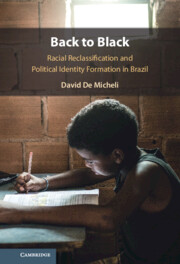Book contents
- Back to Black
- Back to Black
- Copyright page
- Epigraph
- Contents
- Figures
- Tables
- Acknowledgments
- 1 Introduction
- 2 The Puzzle of Racial Reclassification
- 3 Theory
- 4 Education as a Mechanism of Exposure
- 5 Education and Reclassification
- 6 Affirmative Action and Reclassification
- 7 Implications for National Politics
- 8 Conclusion
- References
- Index
3 - Theory
Racial Reclassification as Political Identity Formation
Published online by Cambridge University Press: 14 November 2024
- Back to Black
- Back to Black
- Copyright page
- Epigraph
- Contents
- Figures
- Tables
- Acknowledgments
- 1 Introduction
- 2 The Puzzle of Racial Reclassification
- 3 Theory
- 4 Education as a Mechanism of Exposure
- 5 Education and Reclassification
- 6 Affirmative Action and Reclassification
- 7 Implications for National Politics
- 8 Conclusion
- References
- Index
Summary
Chapter 3 details the argument to explain the reclassification reversal and elaborates the causal mechanisms. I begin by defining the concept of “political identity” as I use it throughout this work, distinguishing it from related concepts like social identity. I then argue that institutional change in national-level social policies brought about unprecedented access to education for lower-class citizens (who are likely candidates for reclassification) and show the evolution in educational access from the 1980s to the 2010s. At the individual level, greater education increased the exposure of individuals to racial hierarchies and inequalities, leading them to develop racialized political identities and choose blackness. I identify three main causal pathways: greater exposure to (1) information, (2) social contacts and networks, and (3) labor market experiences and discrimination. I conclude by summarizing the novelty of the hypothesis and the observable implications I test empirically in the chapters that follow.
- Type
- Chapter
- Information
- Back to BlackRacial Reclassification and Political Identity Formation in Brazil, pp. 56 - 94Publisher: Cambridge University PressPrint publication year: 2024

